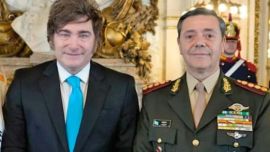If consensus is right and Alberto Fernández officially becomes Argentina’s next president tomorrow, he will have little time to celebrate. Given the delicate state of Argentina’s economy, the six-week transition until his inauguration on December 10 seems too long to relax: the pressure on the currency and the Central Bank reserves, which dominated headlines this past week, is only an example of what could be coming.
Fernández and his opponent, President Mauricio Macri, have a massive responsibility in leading this complex process. In 2015, when Macri won the presidency in a second round against the government-endorsed candidate Daniel Scioli, the transition only needed to be about symbols – and both sides failed at that. The then-president Cristina Fernández de Kirchner received president-elect Macri in Olivos but declined to be photographed with him. Then the pair could not agree on when and how to appear together for the symbolic transfer of the presidential sash and baton (he wanted it to take place in the Casa Rosada, she preferred Congress).
The 2019 transition is more dramatic than symbols can get. With Central Bank greenbacks flying away and the International Monetary Fund (IMF) in wait-and-see mode until the next government defines its policy path, Macri and Fernández are obliged to sit at a table and coordinate some terms. Will they?
The last sprint of the campaign points toward the opposite direction. After the primary, Macri called Fernández a couple of times and their economic teams met and opened channels to discuss possible courses of action. Dialogue ceased as the campaign peaked, and as the president resorted back to his more hardline language about the country’s need to escape the populist evil that he claims Fernández and his Peronist coalition represents.
The confrontation reached personal levels during the second presidential debate last Sunday, when Fernández mentioned the president’s late father Franco, and Macri reportedly told him off for that in the break. The Peronist challenger said this week he does not talk to Macri any more.
Both Macri and Fernández are pragmatic enough to change if they feel they have to for their own benefit. But there is also the risk of mutual solipsism.
Macri threw out an impressive last month of campaign, holding massive rallies around the country under his “#SíSePuede” (“Yes, we can”) banner, his last attempt to turn the election around and force a second round next month. In reality, his presidential campaign was less about this election than his political afterlife, as he hopes to play a role in what emerges as the opposition and sustain a legacy as the spiritual leader of the centre-right party he created over a decade and a half ago. But as he seeks to continue to profit from Argentina’s historic Peronist/anti-Peronist schism, Macri might feel tempted to attribute any further evils that might come the Argentine way to the newly elected “populist” government.
There is also consensus in political and economic circles that things might have to get worse before they get better. The rising gap that widened this week between the official foreign exchange rate and that on the black market (or the bond market used legally to fly cash out of the country) is an indication of where things might stand when Fernández takes office in December. But timing is almost everything in politics. If a new devaluation is inevitable, Fernández will want to blame it on Macri; and Macri would want to hold it until Fernández takes office. Do not expect agreement on that front.
As if we are living The Day After Tomorrow, the 2004 disaster movie. A storm is again brewing and the leadership are not getting the public ready for it. As early as Monday, the country might wake up to further restrictions on the currency market to weather the tempest. The two candidates’ teams are already discussing this at working level, even without an explicit green light that might never come from either of their respective bosses. Among the staff at the Economy Ministry and the opposition candidate’s own advisers there is the conviction that a further descent into chaos would only delay and make an eventual recovery even more difficult – everybody would lose. But staffers are not politicians – and their jobs do not depend on votes.
In an ideal world, the president and the president-elect would get allow themselves to be photographed shaking hands with one another, once the heat of tomorrow’s election is over. They would tell Argentines, and the world, that they will work together to calm the stormy changeover.
Of course, the world is far from ideal – even Argentina even
more so.related news




















Comments